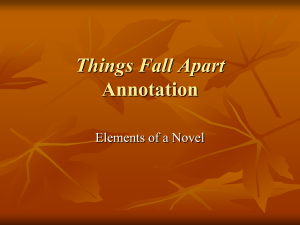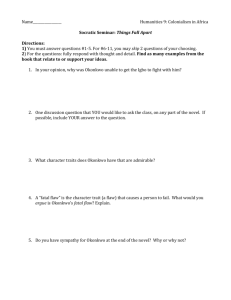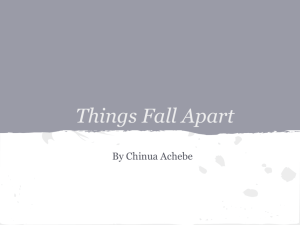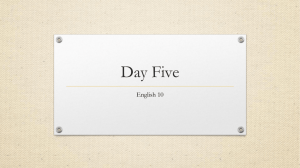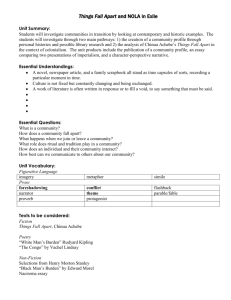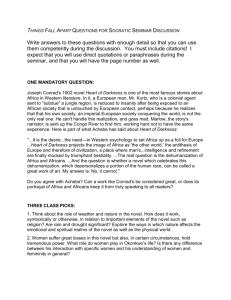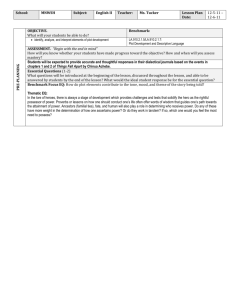Things Fall Apart – ideas for writing prompts You may pick a
advertisement
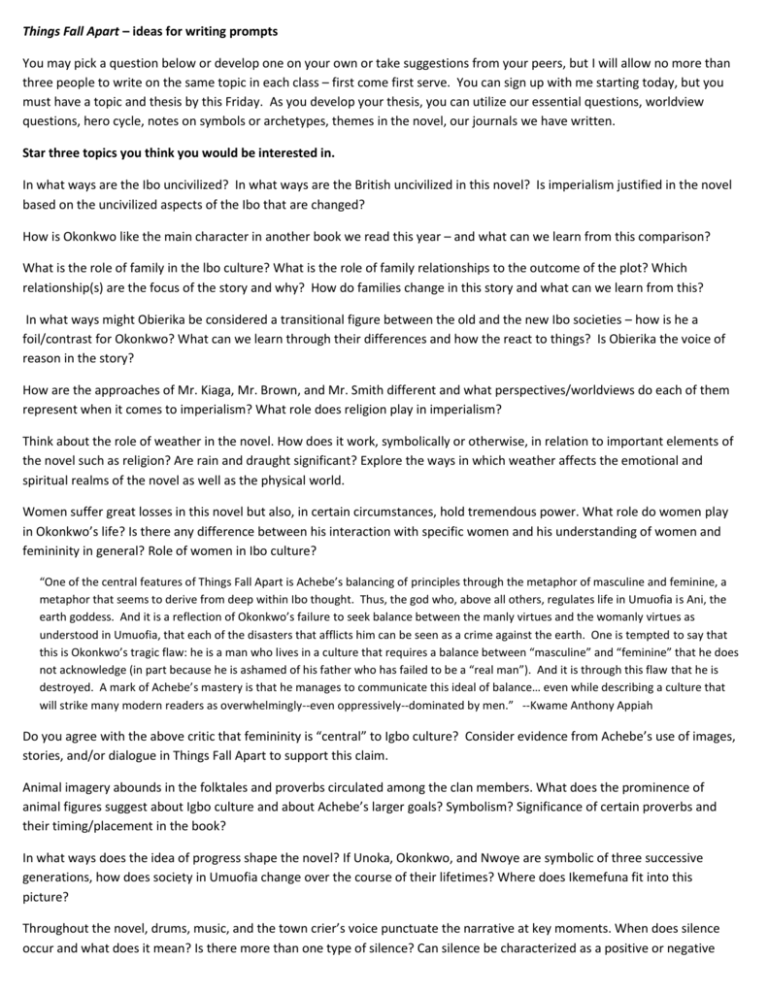
Things Fall Apart – ideas for writing prompts You may pick a question below or develop one on your own or take suggestions from your peers, but I will allow no more than three people to write on the same topic in each class – first come first serve. You can sign up with me starting today, but you must have a topic and thesis by this Friday. As you develop your thesis, you can utilize our essential questions, worldview questions, hero cycle, notes on symbols or archetypes, themes in the novel, our journals we have written. Star three topics you think you would be interested in. In what ways are the Ibo uncivilized? In what ways are the British uncivilized in this novel? Is imperialism justified in the novel based on the uncivilized aspects of the Ibo that are changed? How is Okonkwo like the main character in another book we read this year – and what can we learn from this comparison? What is the role of family in the lbo culture? What is the role of family relationships to the outcome of the plot? Which relationship(s) are the focus of the story and why? How do families change in this story and what can we learn from this? In what ways might Obierika be considered a transitional figure between the old and the new Ibo societies – how is he a foil/contrast for Okonkwo? What can we learn through their differences and how the react to things? Is Obierika the voice of reason in the story? How are the approaches of Mr. Kiaga, Mr. Brown, and Mr. Smith different and what perspectives/worldviews do each of them represent when it comes to imperialism? What role does religion play in imperialism? Think about the role of weather in the novel. How does it work, symbolically or otherwise, in relation to important elements of the novel such as religion? Are rain and draught significant? Explore the ways in which weather affects the emotional and spiritual realms of the novel as well as the physical world. Women suffer great losses in this novel but also, in certain circumstances, hold tremendous power. What role do women play in Okonkwo’s life? Is there any difference between his interaction with specific women and his understanding of women and femininity in general? Role of women in Ibo culture? “One of the central features of Things Fall Apart is Achebe’s balancing of principles through the metaphor of masculine and feminine, a metaphor that seems to derive from deep within Ibo thought. Thus, the god who, above all others, regulates life in Umuofia is Ani, the earth goddess. And it is a reflection of Okonkwo’s failure to seek balance between the manly virtues and the womanly virtues as understood in Umuofia, that each of the disasters that afflicts him can be seen as a crime against the earth. One is tempted to say that this is Okonkwo’s tragic flaw: he is a man who lives in a culture that requires a balance between “masculine” and “feminine” that he does not acknowledge (in part because he is ashamed of his father who has failed to be a “real man”). And it is through this flaw that he is destroyed. A mark of Achebe’s mastery is that he manages to communicate this ideal of balance… even while describing a culture that will strike many modern readers as overwhelmingly--even oppressively--dominated by men.” --Kwame Anthony Appiah Do you agree with the above critic that femininity is “central” to Igbo culture? Consider evidence from Achebe’s use of images, stories, and/or dialogue in Things Fall Apart to support this claim. Animal imagery abounds in the folktales and proverbs circulated among the clan members. What does the prominence of animal figures suggest about Igbo culture and about Achebe’s larger goals? Symbolism? Significance of certain proverbs and their timing/placement in the book? In what ways does the idea of progress shape the novel? If Unoka, Okonkwo, and Nwoye are symbolic of three successive generations, how does society in Umuofia change over the course of their lifetimes? Where does Ikemefuna fit into this picture? Throughout the novel, drums, music, and the town crier’s voice punctuate the narrative at key moments. When does silence occur and what does it mean? Is there more than one type of silence? Can silence be characterized as a positive or negative occurrence? What are the implications of the fact that Unoka takes his flute with him to the Evil Forest when he dies? Okonkwo’s silence (death) at the end? What words does Achebe choose to keep in the Ibo language and why? How does he portray their way of speaking and the beauty of their language? How does the inclusion of untranslated foreign words and unexplained cultural concepts affect your reading of the novel and your understanding of and relationship to the Igbo culture being presented? How does the tone of the novel change between the first, second, and third segments. Why did Achebe split the book up like this? Why does he wait to introduce the British until the second segment? What is chi? Explain the importance of chi in shaping Okonkwo's destiny. Achebe suggests that Igbo culture is dynamic (constantly changing). Find evidence in the novel to support this notion. And/or determine if Okonkwo is a dynamic character. (any question involving variations on flat, static, round, dynamic) What is the importance of traditions and rituals in the Ibo society? In our society? AP styled questions: 2003 prompt: Novels often depict characters caught between colliding cultures – national, regional, ethnic, religious, institutional. Such collisions can call a character’s sense of identity into question. In Things Fall Apart, choose a character who responds to such a cultural collision. Describe the character’s response and explain its relevance to the work as a whole. 2003 prompt: According to Northrop Frye, “Tragic heroes are so much the highest points in their human landscape that they seem the inevitable conductors of the power about them, great trees more likely to be struck by lightning than a clump of grass. Conductors may of course be instruments as well as victims of the divine lightning.” In Things Fall Apart, explain how a tragic figure functions as an instrument of the suffering of others. Explain how the suffering brought upon others by that figure contributes to the tragic vision of the work as a whole. (Don’t have to use Okonkwo for this) 2004 prompt: The important themes in literature are sometimes developed in scenes in which a death takes place. In Things Fall Apart show how a specific death scene helps to illuminate the meaning of the work as a whole. SAT styled questions: Although most people’s goal is to be happy at all times, being constantly satisfied and untroubled can actually prevent people from changing for the better. After all, why go to the trouble of changing if one is content with the way things are? On the other hand, discontent often motivates people to make necessary changes. What revolution was not caused by widespread discontent? Who among us has not vowed to make a change because we are unhappy with some aspect of our lives? Is discontent often the first step to action? Anger is an emotion common to all human beings. Laurence Peter said, “Speak when you are angry and you’ll make the best speech you’ll ever regret.” On the other hand, Malcolm X had a view about anger claiming, “Usually when people are sad, they don’t do anything. They just cry over their condition. But when people get angry, they bring about a change,” Maybe anger has two sides like a coin? How do you feel about the idea that anger can be both a positive or negative force depending upon how it is used? Write down other topics/questions from your peers that you liked: ___________________________________________________________________________________________________ ___________________________________________________________________________________________________ ___________________________________________________________________________________________________
